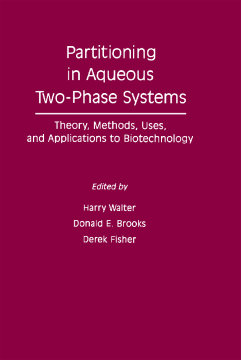
Additional Information
Book Details
Abstract
Partitioning in Aqueous Two-Phase Systems: Theory, Methods, Uses, and Applications to Biotechnology is a collection of papers that discusses the applications of aqueous two-phase systems to problems of separation and extraction of macromolecules, organelles, and cells. Papers focus on the theoretical basis and the practical details of the procedures used. Some of the papers describe in one or a few steps how two components can be separated by the investigator manipulating their partitions so that one component is in one phase and the other component is in the other phase or at the interface. Investigators can also avail of developed batch extractions for plant organelles, cell membranes, nucleic acids, and proteins. The book cites as an example the partitioning of right-side-out and inside-out vesicles (obtained from fragments of thylakoid membranes) to the top and bottom phases, respectively, of a Dx-PEG system. Other papers describe the use of the countercurrent distribution when single extraction steps are not sufficient to produce a separation in materials that do not differ greatly in their partitioning behavior. The collection can prove valuable for bio-chemists, cellular biologists, micro-biologists, and developmental biologists.
